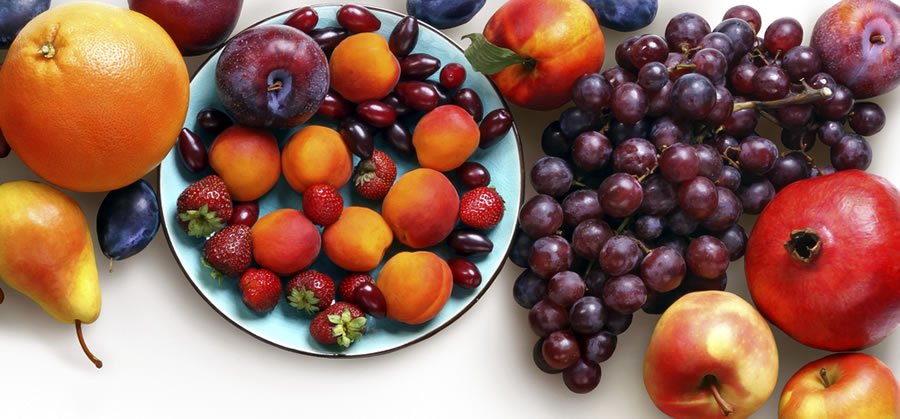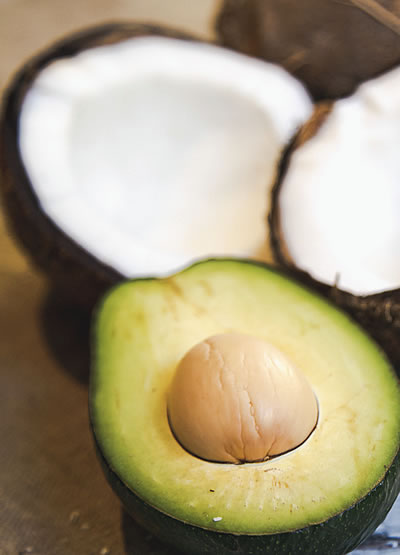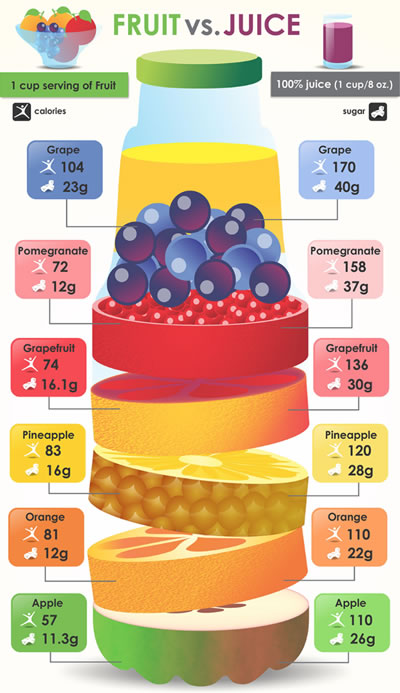Are some fruits better than others?
Fruits do contain sugar, but it’s naturally-occurring sugar. Put simply, an apple is never going to send your blood sugar soaring the way a candy bar, crammed with added sugars, does. And let’s don’t even get started on comparing an apple with a can of coke.

Are some fruits better than others?
For more than 40 years, the Pritikin Longevity Center in Miami has been helping people worldwide shed weight and live well.

And for more than 40 years, Pritikin’s faculty of scientists, physicians, and registered dietitians have never put any one fruit – or any food, for that matter – on a pedestal.
For losing weight and living healthfully, “virtually all fruits are fantastic,” states Kimberly Gomer, MS, RD, Director of Nutrition at the Pritikin health resort.
There are only two fruits she and her colleagues at Pritikin caution against: avocados and coconuts.
Avocados are problematic if weight loss is your goal. They’re high in fat and therefore dense with calories. Coconuts are high in heart-damaging saturated fat.
Otherwise, fruit is a very healthy choice, and for all sorts of reasons.
Fruit is:
Low in calorie density.
That’s really important if you’re trying to lose weight. When you focus your diet on low-calorie-dense foods like fruits and vegetables, you’re eating a large amount of food throughout the day. Your stomach is filling up and feeling satisfied, which means you aren’t fighting hunger, which means it’s a lot easier to drive past the fast-food drive thru.
And nicely, every bite you’re taking is low – very low – in calories. After vegetables, the lowest-calorie-dense food on the planet is fruit. So fruit (despite popular lore) is a friend of weight loss.
Here’s a telling example: A low-calorie-dense food like an apple is a mere 10 calories per bite. A high-calorie-dense food like an energy bar is often about 70 calories per bite. Yes, that energy bar tallies up a ton of calories. And because it’s so small in size (four bites and you’re done), it offers little in the way of hunger-curbing satisfaction.
Fruit is:
High in naturally-occurring fiber.
In whole, unprocessed foods like fruits, vegetables, legumes (beans), yams, and potatoes, you get a bounty of naturally-occurring fiber. That’s one key reason why these foods take up a lot of space in our stomachs. Naturally-occurring fiber also help stabilize blood sugar. “And fiber is calorie-free,” adds Pritikin nutritionist Kimberly Gomer, “so it brings wonderful benefits to our bodies without bringing in extra calories.”
Fruit is:
High in many more nutritional benefits.
Fruits, from berries to melons to mangoes to bananas, are nutritional powerhouses, chock-full of not only fiber but also vitamins, minerals, antioxidants, and phytochemicals – in short, just about everything our body needs to function optimally.
Fruit is:
Very, very low in health detractors.
Almost all whole fruits have nothing, or next to nothing, in the way of health and waistline killers like fat, cholesterol, sodium, and added sugars. If you want to get as far away as possible from the SAD (standard American, disease-producing) diet, fill your day with fruit and other naturally fiber-filled plant foods like vegetables, beans, and whole grains.
Fruit = Good Health
Since its inception in 1975, the Pritikin Longevity Center has encouraged fruit consumption.
And since 1975, more than 100 studies published by scientists at UCLA and other leading universities on people who have come to Pritikin have affirmed that Pritikin-style food and daily fitness can:
- Lower blood sugar1
- Shed weight2
- Lower blood pressure3
- Reduce cholesterol levels, even among people already using statins4
- Reduce or eliminate the need for diabetes medications5 and
- Slow and even reverse the progression of diabetes and related conditions like Metabolic Syndrome6
“But fruit’s high in sugar, right?”
Have you been told to avoid fruit because it’s high in sugar?
Fruits do contain sugar, but it’s naturally-occurring sugar. Put simply, an apple is never going to send your blood sugar soaring the way a candy bar, crammed with added sugars, does. And let’s don’t even get started on comparing an apple with a can of coke.

Fruit Vs. Fruit Juice
For blood sugar control and losing weight, do make sure you’re eating the whole fruit, not fruit juice, advises Pritikin’s Director of Nutrition Kimberly Gomer.
“Enjoy oranges, not orange juice. Pack a big bunch of grapes for office snacks. Leave the juice bottles in the vending machine. Fruit juices have been stripped of the fiber that comes with the whole fruit, and your blood sugar and waistline don’t like that.”
Steer Clear of Dried Fruit
Yes, you’ll be getting the fiber if you eat dried fruit, but you won’t be getting the stomach-filling water that comes with fresh, whole fruit. For most of us, dried fruit is fattening.
Best For Diabetes Control
If you have diabetes or similar challenges such as pre-diabetes, Metabolic Syndrome, or insulin resistance, the physicians, dietitians, and other faculty at the Pritikin health resort do have a few caveats regarding fruit.
-
Don’t Eat Fruit Alone.
First, don’t eat fruit alone. Pair your whole fruit with another fiber-rich food to slow the release of the fruit’s sugar into the system.
For example, slice your strawberries into a bowl of steaming oatmeal.
For a snack, munch on some carrot sticks along with your apple.
Enjoy of bowl of bean-and-veggie soup with your slice of watermelon.
Dining out? Want a dessert? Ask for a bowl of luscious raspberries or other fresh fruit instead of the gooey, sugary, fatty choices on the dessert cart. Even if fresh fruit isn’t on the menu, you can bet there’s fresh fruit in the kitchen, and most chefs will happily serve up a dish for you.
-
Love Your Berries.
To keep a really good lid on your blood sugar, enjoy berries – blueberries, strawberries, blackberries, raspberries… yum. In their off-season, pick up bags of frozen berries at the market. Just make sure the ingredient list shows berries, and only berries. You don’t want to see any added sugars. Berries have a lower sugar content than other fruits, “so for people with diabetes, they are a more blood sugar-forgiving fruit,” notes Kimberly Gomer.
-
Become Less Insulin Resistant.
Insulin resistance means that your pancreas is producing insulin, but your body’s cells are “resisting” it. They’re unable to use that insulin. As a result, glucose (sugar) builds up in the blood.
“The first and most important goal for our guests at Pritikin who are diabetic is to become less insulin resistant,” explains Kimberly. “That happens through daily exercise, our Pritikin Eating Plan, and weight loss.” Based on blood sugar readings, which are monitored daily at Pritikin, fruit servings for some guests with diabetes may be temporarily decreased to three servings daily. “But ultimately, we want everyone following our Pritikin Eating Plan recommendation of four to five servings of fruit daily for the many nutritional and low-calorie-dense benefits of fruit.”
Bottom Line | Are Some Fruits Better Than Others?
No. Fruits are excellent foods for your health and weight-loss efforts. The only ones to avoid are avocados (if you’re trying to lose weight) and coconuts (they’re high in artery-clogging saturated fat).
Don’t be afraid of fruit anymore.
Fill your shopping cart with the gorgeous greens, blues, reds, yellows, and oranges of fresh, whole fruit.
And savor every sweet bite.
Sources
- 1 Diabetes Care, 1994; 17 (12): 1469.
- 2 Archives of Internal Medicine, 1991: 151: 1389.
- 3 Journal of Applied Physiology, 2005; 98 (1): 3
- 4 American Journal of Cardiology, 1997; 79: 1112.
- 5 Journal of Applied Physiology, 2005; 98 (1): 3
- 6 Journal of Applied Physiology, 2006; 100 (5): 1657.